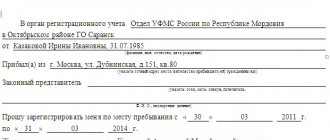Often one property has several owners. They have some share or a separate room in this property. If one of the owners decides to sell his property, he must initially offer his share to the other co-owners. This is due to the fact that they have the right of first refusal. They are offered an object at a certain price, at which, in case of refusal, they must offer the room or share to other buyers. If the price decreases, you will again have to contact the co-owners about an offer to buy part of the apartment.
The concept of pre-emptive right
It is represented by the right of the owner of a room or share in an apartment to purchase another part sold by a co-owner. Only if an official refusal is issued can this property be further offered to third parties.
The process of using the pre-emptive right to purchase is regulated by Article 250 of the Civil Code. Therefore, the owner of an object, before selling it to others, must make sure that all his neighbors in a communal apartment or co-owners of a privatized object are notified of the planned sale, and also do not want to exercise their legal right. It is advisable to formalize the refusal in writing. Additionally, the seller must have evidence that he actually gave notices to the co-owners about the sale of his part.
Emerging problems
People who own only part of one property almost always face certain difficulties when selling property. This is due to the fact that other co-owners have a pre-emptive right to purchase a share. The most popular difficulties and problems include:
- Other residents of the property create obstacles to the sale of the room. For example, they directly tell potential buyers that they will ruin their lives, and at the same time do not want to buy out the share themselves.
- The co-owners refuse to accept a special notice of sale of the property, so the document must be sent by registered mail with return receipt requested in order to have proof of compliance with legal requirements.
- Initially, shareholders refuse to buy out the share, but then go to court to challenge an already concluded deal with third parties. But if the seller has evidence of notifying citizens, then the court will not satisfy the claims.
- Several shareholders may express a desire to purchase part of the apartment, and in such a situation the seller can independently choose with whom the transaction will be concluded.
- You don’t have to notify other co-owners about the sale of a part if there is an agreement with only one tenant that he will buy the share.
The pre-emptive right to purchase a share in an apartment with a minor implies that it is necessary not only to obtain a refusal to buy out the share from his official representatives, but also to obtain permission to sell the property from the guardianship authorities. At the same time, it is not allowed for the rights of the child to be violated in any way due to this transaction.
About painful issues
Okay, let's leave this logic to the conscience of the notaries. I tried to call the guardianship, find out what was needed and how quickly they would give such a refusal. Answer: We don’t give information over the phone, come during office hours. Probably, the contact center of the guardianship service is needed only to dictate the appointment time. I went on the reception day, they handed me a list of documents on two sheets, which must be collected by both the seller of the room and the neighbor who gives a refusal for the child, a list similar to the one that banks require for a mortgage.
We decided to send a notification through a notary in the same way as with the second neighbor, so as not to fool ourselves with guardianship. The notary said to call in 2 months. After 2 months, the notary received a receipt from the second neighbor, we are waiting and waiting from the third. A month later, the notary states that the receipt was lost in the mail, this often happens. You need to write an application to the post office, within a month the post office will send confirmation of delivery of the letter to the addressee and you will receive a certified application.
Also read: Administrative fines of the Ministry of Internal Affairs, find out debt by last name
How to prevent risks?
Every person who owns only a certain part of real estate should have a good understanding of what the pre-emptive right to purchase a share is. In this case, you can avoid a situation where the transaction for the sale of property will be challenged. To prevent various risks, the following points are taken into account:
- other apartment owners are notified correctly and promptly about the planned sale of part of the property;
- if a citizen has good relations with other co-owners, then a written refusal is requested;
- If the owners of the apartment do not want to write a refusal, then a notification is sent to them by registered mail with acknowledgment of delivery.
Only if there is evidence that the seller has not violated the rights of other residents can it be guaranteed that the transaction will not be challenged in court.
Sales stages
The first thing you need to do before you start preparing real estate for sale is to make sure that the apartment is privatized and the ownership of it is recorded in Rosreestr.
Attention! It is impossible to sell a room received under a social tenancy agreement, and therefore the owner will first need to privatize the social housing and only then sell it.
If the owner does not want to waste time on privatization, he has the legal right to make an exchange, but to do this he will need to contact the municipality with a request to approve the exchange and draw up a special agreement.
Is it possible to bypass the right of first refusal?
There are certain tricks that allow you not to receive a refusal from other citizens and not to send them a notice of the sale of part of the property. These main methods include:
- Execution of a gift agreement, rather than a sale based on a purchase and sale agreement. The pre-emptive right to purchase applies exclusively to the sale of a share and not to a gift. Every person has the right to freely dispose of his property, so he can give a share to any person without difficulties or the possibility of challenge. But if the co-owners have evidence that a gift transaction is covered by a transaction for compensation, then it will be recognized by the court as feigned on the basis of Art. 170 GK.
- Increase in the value of part of the property. The sale agreement may indicate a high price, but in fact the object is transferred at a different price. Such transactions are fraudulent, so if their nuances are made public, they are considered void.
- Registration of a transaction using collateral. For example, the seller of a room issues a loan from the buyer, for which an official document is drawn up. Under this agreement, part of the real estate is provided as collateral. Next, a compensation clause is written, as a result of which the lender refuses the money, and the seller transfers his property to him for this. But when using such a scheme, you will have to officially register both the pledge agreement and the compensation contract.
Such tricks are usually used if there are really bad relations between the residents of the same property, so citizens try to use their pre-emptive right to annoy the co-owner of the property.
Documentation
Any type of transaction must be accompanied by a certain package of documents confirming the legality and purity of the transaction.
Documents for selling a room in a communal apartment:
- certificate of registered/discharged citizens;
- notification to neighbors about the sale of the room (it is necessary to indicate in the content technical information about the object and its cost);
- contract of sale;
- extract from the BTI;
- title documents;
- cadastral passport;
- permission from your spouse;
- permission from the PLO (if there are children under 18 years of age).
The package of documents may be supplemented, depending on how the sale will be completed. You may also need a preliminary purchase and sale agreement or a deed of gift.
Rules for notifying citizens
If the owner of a share in one property decides to sell his property, then he performs the following actions:
- on the basis of Article 250 of the Civil Code of the Russian Federation, all other co-owners have a pre-emptive right to purchase, so initially a share at a certain cost is offered to them;
- then a notice is drawn up in writing, which contains information about the planned sale of the property;
- the document indicates at what price the transaction is planned to be completed;
- This document may offer installment plans or other opportunities that allow other apartment owners to buy out the share;
- on the basis of this notification, the remaining property owners draw up a waiver or enter into a transaction.
If citizens simply refuse to accept the notice, it is sent to them by mail, and they will additionally have to pay for a return receipt so that the seller has evidence of compliance with legal requirements. Under such conditions, the notification has legal force even if the addressee refuses to receive the letter.
30 days after sending the notifications, you can begin to sell the share to third parties, if the co-owners have not expressed a desire to purchase it themselves.
Methods for sending notifications
It is advisable to hand over the document in person against signature. But in practice, situations often arise when there are too many disagreements between the owners of the same property. But even under such conditions, it is not allowed to ignore the pre-emptive right to purchase a share in the apartment. Notification can be sent in different ways:
- sending a telegram;
- sending a document with the help of a notary;
- sending a valuable letter yourself.
In any case, you will have to pay for the service of notification of delivery of the document. Payment documents confirming the sending of the document must be kept. It is these documents that serve as evidence during legal proceedings.
What information is contained in the notice?
Advance notification of the transaction ensures compliance with legal requirements regarding the pre-emptive right to purchase a share in an apartment. A sample of such a notice can be found below.
The following information must be included in this document:
- apartment address;
- information about the size of the existing share;
- the price at which the property is sold;
- a direct offer to exercise your right and buy part of the property;
- it is indicated that if this proposal is not accepted, the share will be sold to third parties;
- Below is a request to make a refusal or consent in writing;
- The date of the notification and the signature of the applicant are indicated.
The main condition is the need to sell the property exclusively at the price indicated in the notice. If all co-owners refuse to purchase, then you can further sell at this price. If the seller cannot find buyers, then he cannot simply reduce the price. To do this, they again draw up notifications indicating a lower cost. If one of the co-owners agrees to buy out the share, then an agreement is drawn up with him. The pre-emptive right to purchase an apartment allows you to increase the share of existing property owners.
What difficulties might you encounter?
Selling a room in a communal apartment can be accompanied by a number of inconveniences and difficulties that can affect the process of selling a home.
In particular, discomfort may be caused by the following features of the sale of communal housing:
- If some rooms of the apartment are used on the basis of a social tenancy agreement. The seller is obliged to notify the municipal building service of his intention and only after receiving a refusal from this government agency to sell the property.
- If one of the owners is a minor, then the waiver must be signed by his parents or guardians. Also, this refusal must be approved by the Guardianship and Trusteeship Authorities.
- The owner aged 14 – 18 years has the right to independently decide whether to sign the waiver or not. His legal guardians/parents are also required to confirm their child’s decision with a signature. If a conflict arises between the child and his parents, obtaining a refusal may take a long time.
- Some co-owners may live at a different address and even in a different region, and therefore obtaining a waiver from them will require much more time and effort.
- Quite often, co-owners, in order to reduce the cost of the room, refuse to accept the notification letter, thereby preventing the owner of the communal room from selling the property.
Responsibility for violation of rights
Often, citizens who own a share in real estate simply ignore the preemptive right to purchase a room in an apartment, which other co-owners have. This leads to violation of citizens' rights.
The main negative consequence of such a violation is the possibility of challenging the transaction. Since the seller will not have evidence of timely provision of notice by the other co-owner, the transaction is contested. The citizen will have to return the amount of funds received from the buyer, and then complete the procedure based on legal requirements.
Is it necessary to request a waiver?
If there is a good relationship between the co-owners, then it is advisable to ask to write a refusal if the citizens do not want to buy out part of the property.
A refusal is not required if the notification is sent by mail, since the sender still has evidence of compliance with legal requirements. You must wait 30 days for a response. If it is missing, then you can still sell the share to third parties.
Other nuances
The preemptive right to purchase a room in a communal apartment or privatized property is used most often, but it also exists in other areas. These include:
- When renting. If any property is rented out, then the persons living in this apartment, after putting the property up for auction, have priority as buyers. This is due to the fact that the living quarters are already inhabited by these citizens.
- For a municipal facility. If a municipality puts up for auction a building in which citizens live on the basis of a social tenancy agreement, then people are given similar housing on the same basis or a pre-emptive right to purchase the property. Therefore, residents have the right to participate in the auction with other persons, and can also take advantage of their advantage over other participants. Therefore, if they agree to the ransom, then the auction simply does not take place, since a deal is concluded directly with them.
- For seized property. If any object is arrested and confiscated for debts, then it is sold at auction. The debtor can participate in the auction, who additionally has the right to buy it directly without bidding.
The main purpose of this right is the opportunity for people who already use the property to become its full owners.
Selling a room in a communal apartment: pitfalls
The Soviet era has already sunk into the past 20 years ago, but its relic - communal apartments - is still very much alive. For example, in Moscow and St. Petersburg they number in the tens, or even hundreds of thousands. It is not surprising that the market for rooms in communal apartments is quite active; they are in good demand. But the process of their implementation has its own characteristics.
But filing a claim is not enough. The neighbor will also have to deposit into the bank account of the department (department) of the Judicial Department for the constituent entity of the Russian Federation the amount paid by your buyer for the room, fees and duties, as well as other amounts due to the buyer to reimburse the expenses incurred when purchasing the room s. “c” clause 1.2 of the Resolution of the Plenum of the Supreme Court of June 10, 1980 No. 4; Appeal ruling of the Moscow Regional Court dated March 26, 2013 No. 33-3615/2013. This circumstance cools the ardor of even the most persistent.
27 Jun 2020 stopurist 365
Share this post
- Related Posts
- How long does it take to replace a license through government services?
- How to write off loan debts to a bank
- Electricity Consumption Standard for Labor Veterans
- Fine for driving a vehicle without a driver's license









